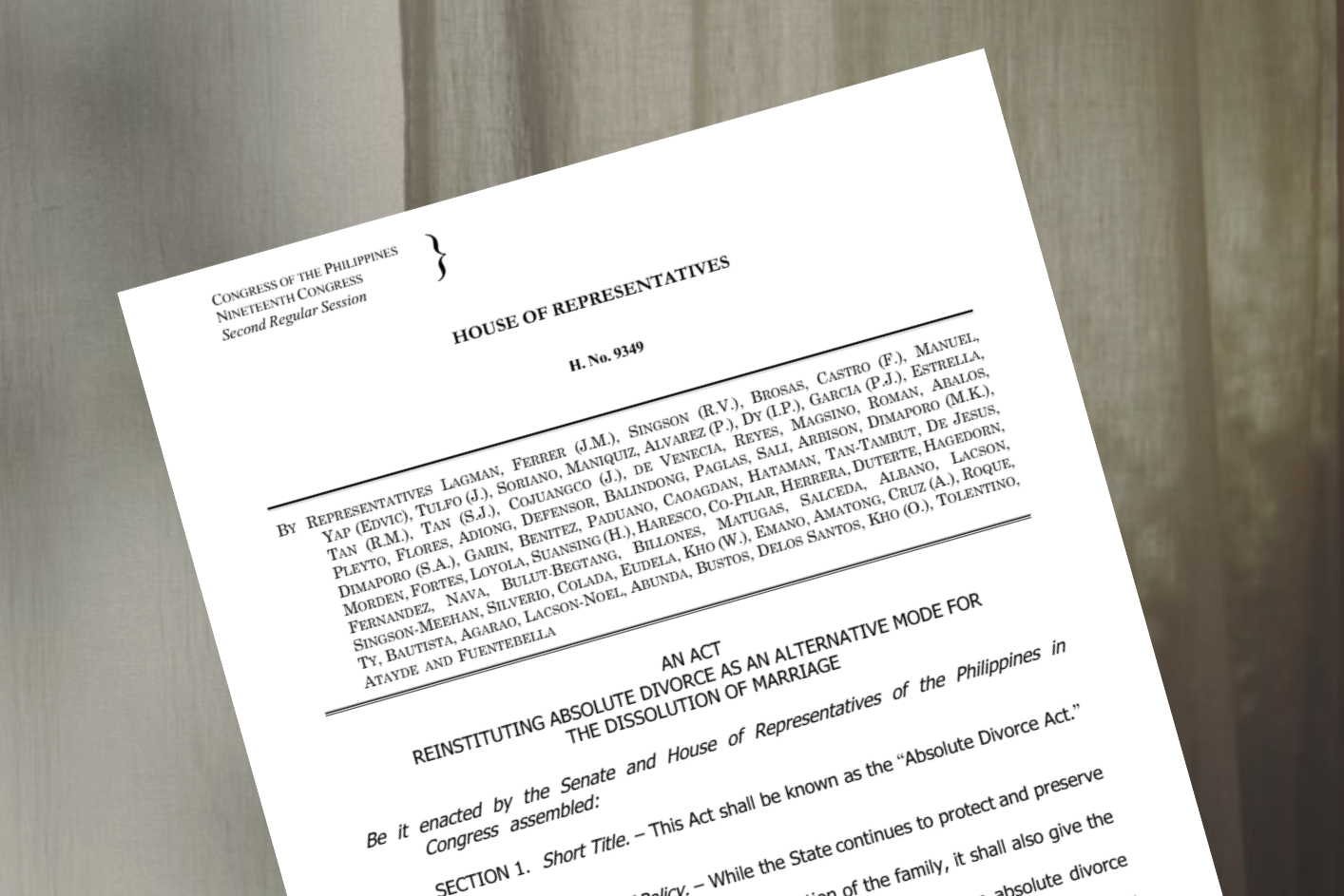Preliminary Points:
1.Engaging the Text of HB 9349 (Reinstituting Absolute Divorce as an Alternative Mode for the Dissolution of Marriage)
- These talking points are not intended to be definitive nor comprehensive in their analysis of HB 9349. These points are offered as matter for consideration in the ongoing discussions on the bill.
- It is in keeping with the Church’s moral and intellectual tradition for Filipino Catholics to fully engage the text of HB 9349 rather than dismiss it outright without discussing its merits and demerits. Clergy and laity should read the bill’s text intelligently and thoroughly before judging it.
- It is better to point out defects or dangers of particular provisions of the bill and propose corrections so that legislators who will be amending and voting on the bill can consider them. If the church leaders simply refuse to discuss the bill’s details with legislators and avoid any form of dialogue, they lose the opportunity to lessen any harm that the bill may cause if it is passed into law without revision.
2. Areas of Jurisdiction
- House Bill 9349 only refers to civil marriages. It does not change the Church’s norms and teachings on the validity of Catholic sacramental marriages.
- The government has the authority to determine the laws related to civil marriages, including their dissolution or annulment.
- The Church does not recognize civil marriages and it does not have any authority over what it does not recognize.
. . . we don’t intend to set the rules on civil marriage. We know that we are in no position to do that in the first place. We respect the legislative bodies of our country and the duty of our honorable legislators to come up with just laws that truly serve the common good. We can only hope and pray that they consider the gravity of the task entrusted to them and the need to engage the citizens in serious conversations about the implications of the laws they make.
CBCP Statement “A Nation Founded on Family, A Family Founded on Marriage” July 11, 2024
3. The distinction between civil and sacramental marriage
- When discussing marriage, we need to be clear about whether we are referring to civil or sacramental marriage. We should not conflate them because different rules on validity and dissolution apply to them. Similarly, we should be clear about whether we are discussing civil or canonical annulments.
4. The Catechism recognizes legitimate grounds for civil divorce (without remarriage).
- “If civil divorce remains the only possible way of ensuring certain legal rights, the care of the children, or the protection of inheritance, it can be tolerated and does not constitute a moral offense.” CCC 2383
- Therefore, divorce is not intrinsically sinful. What the Church considers morally objectionable is divorce with the intention of remarriage. Divorce without remarriage for the legitimate reasons stated in the Catechism only has the effect of a separation, which the Church recognizes and allows. Not all cases of divorce lead to irregular unions. We should not presume the existence of a moral fault in particular instances of divorce without knowing the intention and circumstances of each case
Some Positive Provisions in House Bill 9349
1.The bill gives civil recognition to church annulments (Sec. 7)
- This provision removes the additional step and expense of getting a civil annulment after a church annulment.
2. The factors and grounds that can disqualify an attempt at a legal separation and nullification of marriage in the Family Code are also adopted as disqualifying grounds against granting an absolute divorce (Sec. 9, b)
- The bill does not provide divorce on demand or a no-fault divorce. It grants divorce based on specific grounds that must be verified for every case. The Family Court can reject a petition for divorce if there are insufficient or disqualifying grounds. Decrees of divorce can also be appealed in Appeals Court (Sec, 24).
3. The bill provides financial assistance to petitioners who lack the means to file for civil divorce (Sec. 9, c).
- This provision removes the financial obstacle faced by impoverished petitioners who have legitimate reasons to file for a divorce.
4. The divorce proceeding requires a mandatory 60-day cooling-off period after filing the divorce petition (Sec. 12).
- The cooling-off period allows for reconciliation through pastoral interventions such as marital counseling. Church marital pastoral programs can make a significant contribution here.
- The cooling-off period does not apply to cases involving violence or threats to the lives of spouses or children.
5. Alimony and spousal support for three years for an offended spouse who is not gainfully employed (Sec. 14, e)
- This provision enables unemployed spouses who are suffering unjust marital situations such as domestic violence to come forward with their divorce petition in the Family Court without fear of losing financial support from the offending spouse.
- Spousal support can be extended for a reasonable period if the offended spouse entitled to support is a senior citizen, has a disability, or has limited educational attainment.
6. Reconciliation during the divorce proceedings or after the finality of a divorce decree (Sec. 20, 14)
- Spouses who decide to reconcile during the divorce proceedings or after a divorce decree has already been issued can file a joint manifestation to the Family Court. If the manifestation is judged to be in order, the Court can dismiss the divorce petition (if the divorce proceedings are still ongoing) or nullify the divorce decree.
- A previously divorced couple whose divorce has been nullified after a manifestation of reconciliation can live together without having to undergo a new marriage.
- The Family Court will use due discretion based on evidence to protect the offended spouse or children from future recurrence of violence or threats if a manifestation of reconciliation is filed in divorce cases involving violence or threats to spouses and children.
- This provision can provide the Church with a ministry opportunity to offer programs for marital reconciliation for divorcing or divorced couples.
Some Problematic Provisions in HB 9349
1.Being sentenced to imprisonment for at least six years, even if subsequently pardoned, as a ground for divorce and summary judicial proceedings (Sec 5, a, 4)
- This provision is taken from the grounds for legal separation in the Family Code.
- Having a spouse sentenced to at least six years in prison does not necessarily create a broken marriage. Prisons provide opportunities for spouses to maintain contact through phone, mail, and visits.
- This provision might be too broadly applied to situations where a person receives a prison sentence due to a miscarriage of justice or an abuse of power by government authorities (e.g., political prisoners).
- A pardon may correct a miscarriage of justice or recognize the prisoner’s rehabilitation and readiness to return to society. Such a pardon should be considered a factor negating the use of a prison sentence as a ground for divorce.
- With our current judicial system still vulnerable to corruption and abuse of power, it is not prudent to use the length of a prison sentence as a ground for divorce.
2. Drug addiction, habitual alcoholism, or chronic gambling of the respondent as a ground for divorce (Sec. 5, a, 5)
- The provision does not consider other forms of addictions that can adversely affect family and marital relationships, such as addictions to pornography, sex, the internet, etc.
- The provision can stigmatize persons with addictions as automatically incapable of having a marriage or a family.
- A divorce can become a contributing factor to worsening an addiction.
- While addiction is a medical condition that cannot be cured entirely and can have the possibility of reasserting itself, it can be managed with medication, therapy, and support groups.
- The provision should determine in a scientific and evidence-based manner the level of addiction and types of addiction-related harmful behaviors that should be considered as grounds for divorce.
3. Homosexuality of the respondent as a ground for divorce (Sec 5, a, 6)
- This ground for divorce was drawn from the grounds for legal separation in the Family Code.
- The bill does not define what it means by homosexuality as a ground for divorce. Just as the Church makes a moral distinction between homosexual orientation and homosexual acts, the bill should also make it clear whether having a homosexual orientation is a sufficient ground for divorce or whether there has to be a homosexual activity with another person for there to be a ground for divorce.
- Having had a transitory homosexual attraction in the past, especially during adolescence, is not necessarily a ground for divorce, just as it is not an automatic disqualification for application to the priesthood (CDF, CONCERNING THE CRITERIA OF VOCATIONAL DISCERNMENT REGARDING PERSONS WITH HOMOSEXUAL TENDENCIES IN VIEW OF THEIR ADMISSION TO SEMINARIES AND HOLY ORDERS, Nov 4, 2005).
- Having engaged in homosexual activity should not automatically be a ground for divorce because a person may have experienced such an activity in a situation of sexual abuse or transitory adolescent experimentation out of ignorance or curiosity. These experiences may have happened in the past and have been dealt with appropriately, and have no significant effect on the person’s capacity for a heterosexual marital relationship.
4. Having a sexually transmissible infection found to be serious or appears to be incurable as a ground for divorce (Sec. 5, b, 6)
- This provision is taken from the grounds for annulment in the Family Code.
- Having a serious or incurable sexually transmissible infection does not necessarily create a situation of a broken marriage. The option of abstinence for the sake of protecting a spouse is a humanly possible choice and can be based on the love and commitment the spouses have for each other.
- This provision might be too broadly applied in situations where the sexually transmissible infection was obtained not through sex and without fault of the infected person (e.g., through an infected blood transfusion in the case of HIV or Hepatitis B, a mosquito bite in the case of the Zika virus, or accidental contact with contaminated body fluids or tainted surfaces and clothing in the case of the Ebola virus and mpox.)
- This provision may lead to the infected person’s abandonment when they need care and accompaniment from their spouse.
- Some infections may appear incurable but can be rendered non-transmissible to the uninfected spouse, as in the case of Pre-exposure prophylaxis (or PrEP) for HIV prevention. PrEP is a medicine taken to prevent getting HIV from sexual contact with an infected partner.
A Guiding Principle
Let us turn to the following Christian maxim as our guide in our discussions on HB 9349: “In essentials, unity; in non-essentials, liberty; and in all things, charity.” For things pertaining to protecting families and individuals, especially those in harmful marital situations, we need to come to a consensus for the common good of all. For things that can be left to individual decisions, we need to respect the freedom of conscience of every Filipino, both Catholics and non-Catholics. In all our public discussions and engagements, we need to speak and act with charity and understanding as members of the same human family and community. We should be civil in our language and avoid immediately imputing malice on those with whom we disagree.


